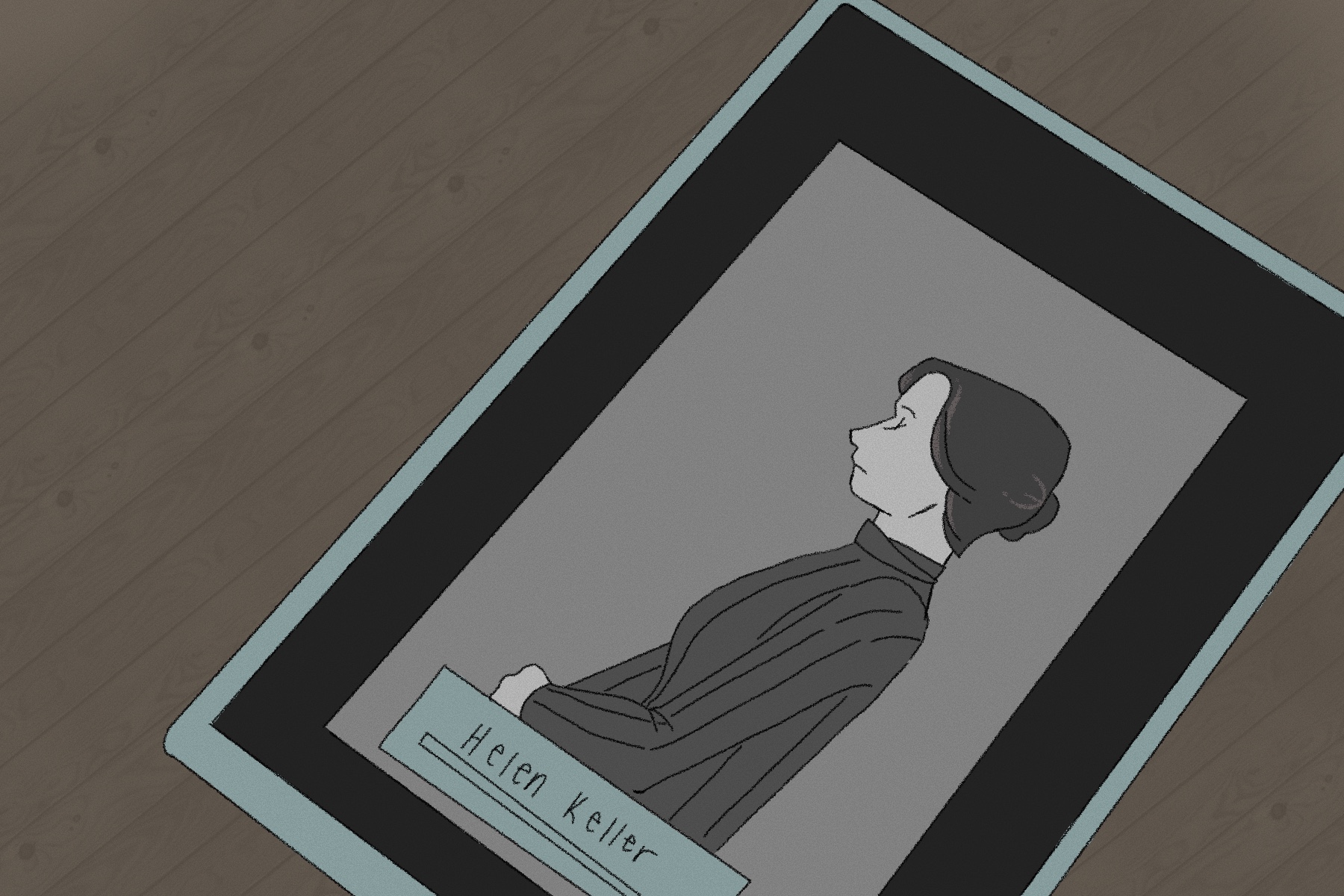Radcliffe College graduate in 1904, Nobel Peace Prize nominee in 1953, Academy Award-winner in 1956, recipient of the Presidential Medal of Freedom in 1964: the accolades of Helen Keller go on and on. A prolific writer herself, she was a published and well-regarded author by the age of 23 and only went on to enjoy further critical acclaim for her subsequent 11 books. Joined by the likes of Rosa Parks, Winston Churchill and Albert Einstein, Keller was included in the TIME Magazine’s 100 Persons of the Century as a “champion of the disabled.” It is safe to say she is one of the world’s most decorated historical figures, but her list of material accomplishments barely begins to cover the true impact of her presence on the world.
Keller’s lifelong work as a disability advocate and writer began in 1882 when she was nineteen months old, as she lost her senses of sight and hearing to an illness modern doctors theorize was scarlet fever or meningitis. Her world narrowed irrevocably, five senses became three and Keller was without the facilities to comprehend her newly dark and silent surroundings. For five years Keller existed in such a void, communicating primarily through temper tantrums when her improvised sign language failed to suffice. It was only when Anne Sullivan, a visually-impaired woman herself, agreed to teach the young deaf-blind girl that Keller’s world became saturated anew with meaning, learning and sensation.
Keller published 12 books and numerous essays during her lifetime, but it is her autobiographical book, “The World I Live In,” that left me truly speechless. “The World I Live In” explores the unique way in which Keller experienced the world, with notable focus on hands and dreams. What sets this work apart from nearly every other piece of writing is the almost insurmountable gap it bridges between author and reader. Keller describes her experiences as a deaf-blind person to her most likely sighted and hearing audience in such a way that her incomparable perception of her surroundings becomes almost fathomable. Keller speaks to a reader base that cannot understand her fully, somehow reaching through our differences to appeal to our common humanity. Keller’s language transcends the senses.
I recall now a peculiar instance from my early childhood, when I was fascinated by the story of Helen Keller but far too young to actually read her books. As an experiment, I would often wander my house, eyes closed and ears blocked, in a futile endeavor to understand the world as Keller did. Naturally, the level of understanding I sought was unattainable because everything I touched, I mentally pictured. As I felt the corner of a tabletop, I could imagine how the table would look before me. As I smelled eggs cooking, I could imagine the sound of the sizzling in the frying pan. I had the context of all five senses and was thus able to extrapolate from touch, taste and smell to sight and hearing. With three intact senses I conceived of what my eyes and ears may perceive. Keller had no such luxury, or no such hindrance.
This curiosity and awe has persisted for years, so it may come as no surprise when I say “The World I Live In” had a profound impact on me. I chose to listen to the audiobook and forgo reading a physical copy. Up until that point, I had never listened to an audiobook voluntarily, finding them less engaging and more difficult to comprehend than text on paper. But I knew the book would challenge my comprehension of the senses, and I wanted to take that challenge from the written words and put it into practice. I expected the book to bring up topics so unfamiliar to me that I would feel uneasy at my lack of awareness. I heightened that discomfort by listening to the audiobook. I know the best learning and growth is borne of discomfort, and I desperately craved any lesson I could learn from Keller.
“Chapter One: The Seeing Hand” is the phrase from my earbuds that prompted me to sit down in attentive silence. Keller begins her book with a particularly joyful recollection in which she feels the vibrations of her dog playing in the grass and reaches out to touch him. She expresses an urge to take a picture with her fingers, because her hand serves the same purpose as the eyes and ears do to the seeing and hearing. She avers that the hands of many go neglected, and the sense of touch goes unrefined. Keller’s prose is evocative but not esoteric as she says, “If [my dog] could speak, I believe he would say with me that paradise is attained by touch; for in touch is all love and intelligence.” The reverence with which Keller writes is palpable through the dictation. It is so blatantly obvious that, although it is in some ways narrower than mine, her world contains dimensions and multitudes foreign to my blunt senses, which are so thoroughly lacking in acuity.
Mundane things to the five-sensed population have particular significance to Keller. On the straight line she says, “It seems to have the quality of inexorableness that duty has. When I have something to do that must not be set aside, I feel as if I were going forward in a straight line, bound to arrive somewhere, or go on forever without swerving to the right or to the left.” She finds meaning in the things so many of us fail to give more than a perfunctory glance. The carelessness of sight is contrasted against the carefulness of touch.
Keller explains her existence fondly and without a hint of resentment towards her disability, because she has found beauty in the world that extends beyond the superficial nature of visual or auditory beauty. Speaking of curving, less uniform lines, Keller says “their variety is inexhaustible and wonderful.” In a world that so many of us would find suffocating, Keller found unmatched wonder. Listening to this, I felt at once ashamed of my taking for granted quotidian beauty and prepared to never make that mistake again. I wanted to approach life with the same awe that Keller once did. It is too easy to lose sight of meaning, as we take for granted that which Keller found miraculous.
Dreams as a concept are introduced in the thirteenth chapter, “The Dream World.” Keller is patiently exasperated at the boundless curiosity of scientific men, who question her tirelessly, inquire as to the nature of her dreams. So she recounts a variety of her dreams, all of which mirror the fantastical, nonsensical dreams of the seeing and hearing. I found joy reading of a particular dream in which Keller oversleeps and is overcome by panic, only to awaken once more at the proper hour. Here, she appeals to reader’s commonality: dreaming about missing an alarm is a ubiquitous experience, and by telling readers this story, Keller reminds us that she is a human like us. Where Keller’s relationship to dreams diverges from the common man’s is in her statement that, in the five years following her illness and before her knowing Sullivan, her waking life was not so different from her dream state. Her body had basic biological wants, but her mind struggled to make sense of her surroundings and connect meaning to touch. In a perpetual state of confusion, the border between dream and reality blurred.
Keller takes time to explain her thoughts on dreams and their nonsense. She especially finds it interesting the disconnect between waking common sense and morality, and dreaming common sense and morality. She chooses a highly effective Charles Lamb quote to emphasize her point: “That which appeared so shifting and yet so coherent, when it came under cool examination, shall appear so reasonless and so unlinked, that we are ashamed to have been so deluded, and to have taken, though but in sleep, a monster for a god.” As I heard this quote I was taken aback by the aptness of it; I listened to it quite a few extra times before moving on to the next section, before the narration came to a final close. I finished the last chapters of “The World I Live In” and knew I would walk away from the book with a great deal more gratitude and curiosity painting my days.
Molyneux’s question is a theoretical query posed by Irish philosopher William Molyneux in 1688: If a blind man were to recover his vision, would he be capable of identifying objects by sight that he had once identified by touch? Over three centuries after Molyneux’s death, we finally have an answer based on empirical data. In 2011, a group of five children underwent surgery to restore their vision and were asked to participate in an experiment to determine the answer to Molyneux’s question. The children, after observing objects by touch, were only slightly more accurate than chance at identifying objects based on sight alone. Keller’s description of lines is relevant once more here. The children whose sight was restored understood the different silhouettes of the objects in a way completely divorced from vision, so even with sight restored the connection remained absent. The straight line to the eye and the straight line to the hand were not congruous until the children learned otherwise.
“The World I Live In” is a tour de force without question. I, a person who has lived with functional eyes and ears my entire life, listened to the prose and was somewhat able to conceive of Keller’s perceptions. Listening to the audiobook put me in a position where I was challenging my habits and purposefully creating a new sensory experience. It was a fitting decision, as Keller’s entire book revolves around the pity it is that we have become dulled to our own senses.
Alongside everyone who has had the privilege of reading Keller’s work, I came away from that book immeasurably grateful and immeasurably ready to learn beauty afresh. I wanted to feel beauty in my bones and not be limited to appreciating the beauty on my retina. To communicate such a powerful message through words alone is a feat so impressive that, as I have already said, even Keller’s vast array of awards cannot duly represent her importance. Helen Keller possessed wisdom beyond what is easily conceivable and a mind so curious and stubborn that it found glory in darkness. “The World I Live In” is a gift to humanity and a cure for jadedness. I am ever so thankful to have read it.
















